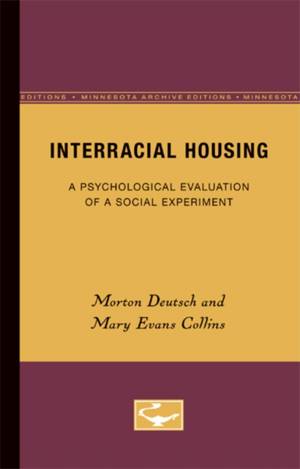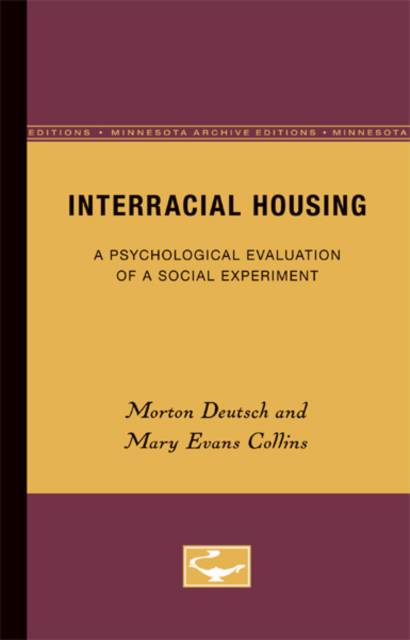
- Retrait gratuit dans votre magasin Club
- 7.000.000 titres dans notre catalogue
- Payer en toute sécurité
- Toujours un magasin près de chez vous
- Retrait gratuit dans votre magasin Club
- 7.000.0000 titres dans notre catalogue
- Payer en toute sécurité
- Toujours un magasin près de chez vous
Interracial Housing
A Psychological Evaluation of a Social Experiment
Morton Deutsch, Mary Evans CollinsDescription
Interracial Housing was first published in 1951. Minnesota Archive Editions uses digital technology to make long-unavailable books once again accessible, and are published unaltered from the original University of Minnesota Press editions.
One of the most crucial strains on democracy today is the practice of racial segregation. In the press, in local, state, and federal government agencies, in fact, wherever people thrash out the problems of democratic living, the question is being discussed.
This book offers facts which throw new light on an important issue in the overall problem of racial segregation. Here are the results of a study comparing two kinds of public housing--segregated and non-segregated.
Two low-rent, public housing projects in which Negroes and whites live as next door neighbors were compared with two similar housing developments in which Negroes and whites are assigned to separate buildings or areas. The study reveals how the people living in these contrasting ways differ in their social relations, community morale, racial attitudes, and other significant social aspects. The research procedures used are explained, and general conclusions about changing prejudices are offered.
Social scientists, psychologists, housing officials, and community leaders concerned with the problems not only of housing but of race relations in general will find helpful guidance here.
In addition to providing much-needed data on an important social problem, the book offers a valuable demonstration of research techniques in social science.
Spécifications
Parties prenantes
- Auteur(s) :
- Editeur:
Contenu
- Nombre de pages :
- 189
- Langue:
- Anglais
Caractéristiques
- EAN:
- 9780816659845
- Date de parution :
- 25-04-51
- Format:
- Livre broché
- Format numérique:
- Trade paperback (VS)
- Dimensions :
- 152 mm x 229 mm
- Poids :
- 263 g

Les avis
Nous publions uniquement les avis qui respectent les conditions requises. Consultez nos conditions pour les avis.






